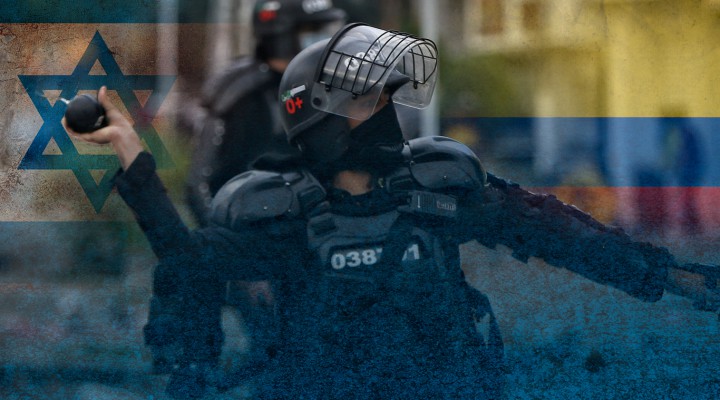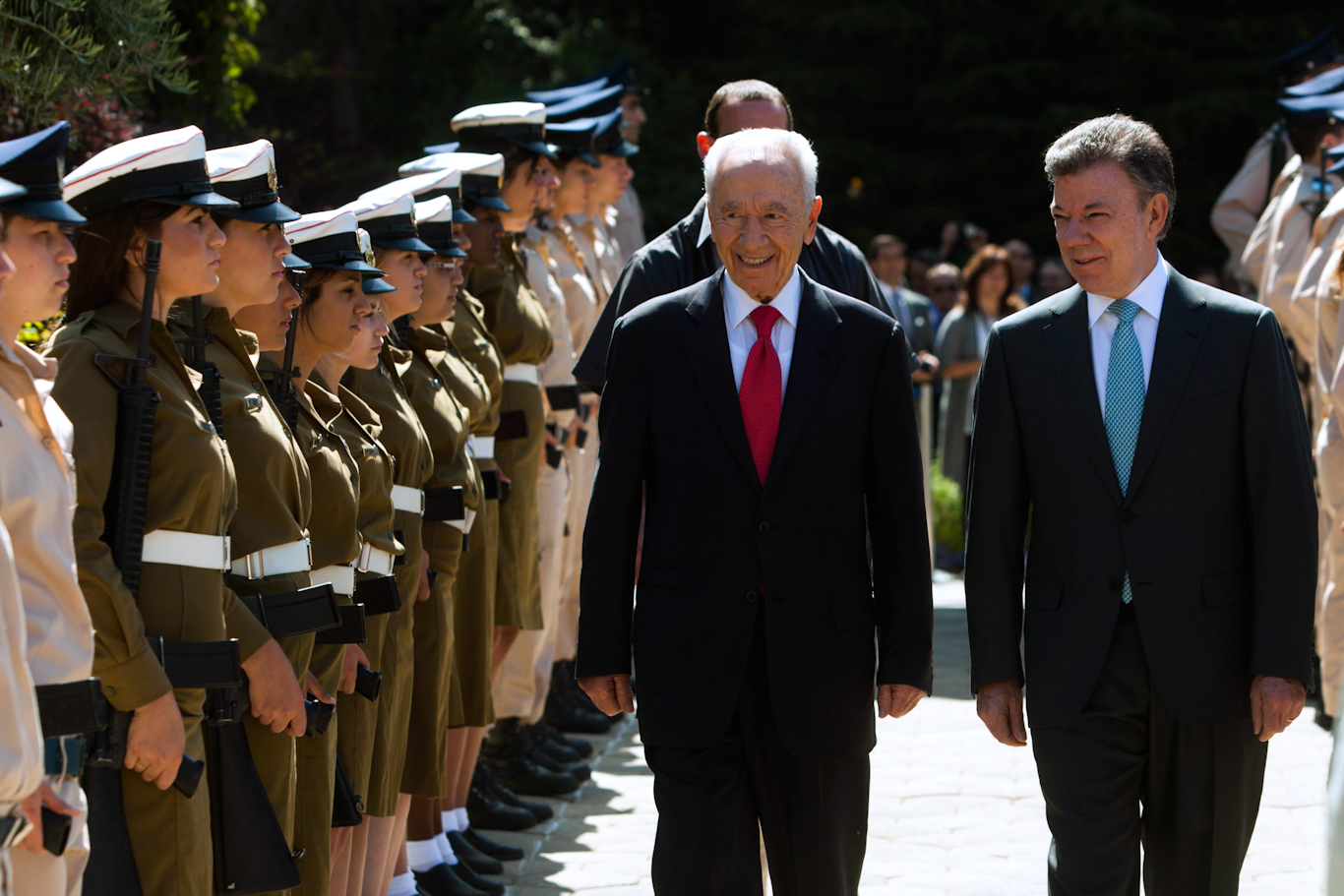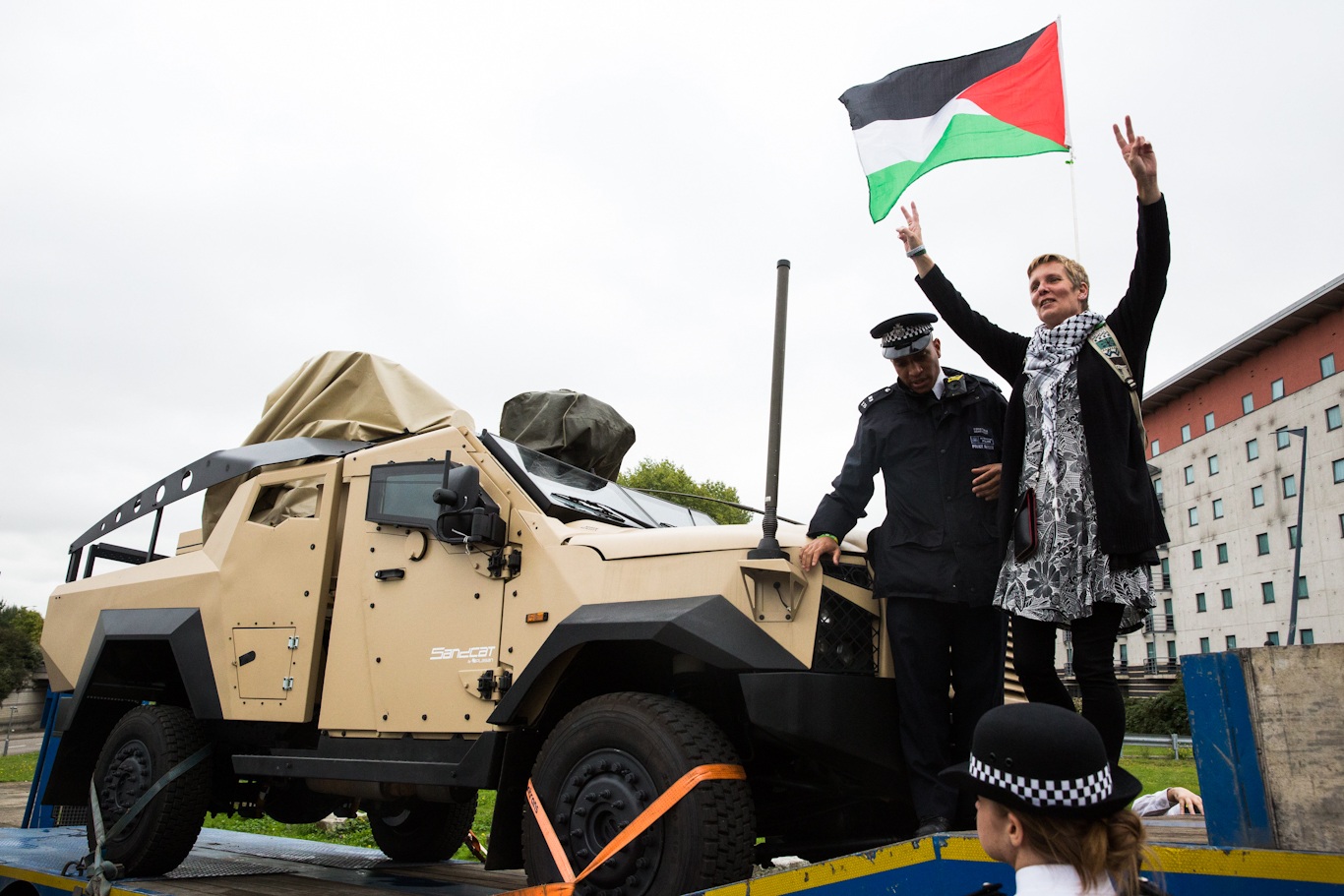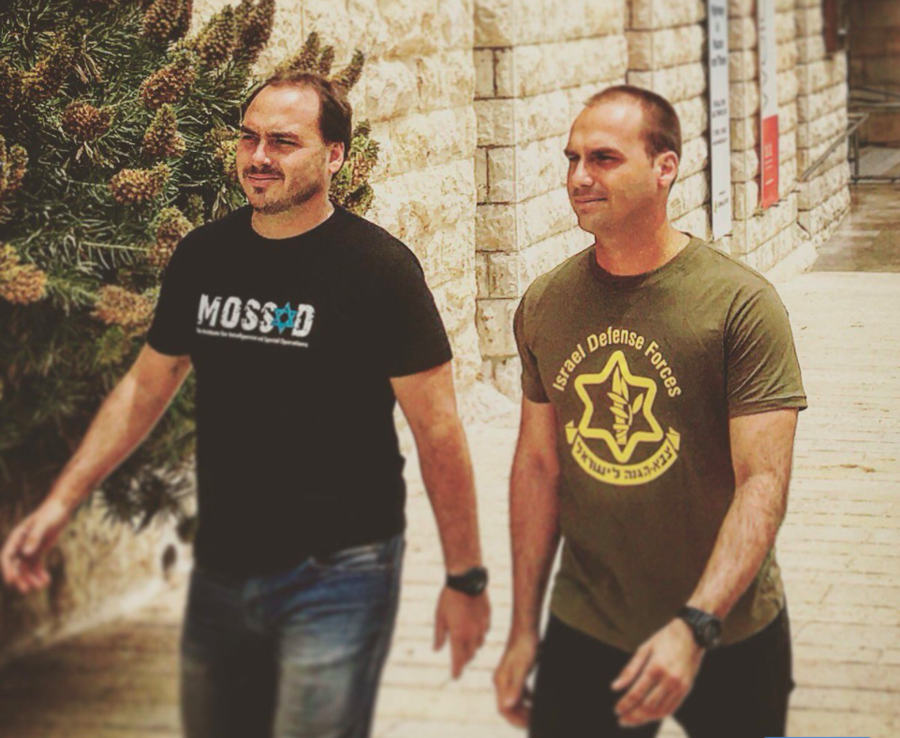Birds of a Fascist Feather: Why Israel Is Aiding Colombia’s Crackdown on Protesters
- Alan MacLeod
- Friday 28 May 21
- 1146
- 0

Photos circulating on social media show Colombian government forces using Israeli weapons against protestors and Israeli-made Sand Cat armored vehicles patrolling the streets of Colombian cities. Alan Macleod investigates the growing ties between the unlikely allies.
For exactly one month now, a nationwide strike has crippled Colombia and has been met with deadly repression by the far-right government of Ivan Duque. As trade unions have shut down major cities, halting mass transit and bringing economic gridlock to the country, government forces have responded with violence. According to government figures, at least 44 people have been killed in protests that began on April 28. A further 500 people have been “disappeared,” more than 100 shot with live fire, and at least 28 have been wounded in the eye by police, the notorious ESMAD riot squad, or by paramilitary organizations linked to the state.
The crackdown on dissent is being abetted by the Israeli government, which itself is dealing with widespread economic, military and social revolt from its captive Palestinian population. Outside of the United States, Israel is the Colombian military and paramilitaries’ chief weapons supplier, and the Colombian police and army have been putting their Israeli training and weapons to use against their own domestic revolt.
The state has essentially declared war on the citizenry, turning streets and neighborhoods into battlefields in an attempt to push through President Duque’s highly controversial neoliberal policies that would eliminate public healthcare, privatize pensions, reduce the minimum wage and levy a 19% tax on staple foods, moves which critics deem an all-out attack on Colombia’s working-class majority. The president is showing no sign of backing down, despite his approval rating slumping to 18%— an all-time low for Colombian heads of state.
Why the Overton Window has Suddenly Shifted on Israel-Palestine
Military connections
Pictures circulating on social media show government forces using Israeli weapons against protestors, while Israeli-made Sand Cat armored vehicles are on the streets of Colombia’s major cities. The standard issue rifles for all branches of the military and the police are Israeli; the Army uses the IMI Galil, Special Forces use the IWI Tavor, while the Air Force, Navy, and police favor the IWI Ace.
Embedded below is an image of Colombian police using the Israeli-made Tavor TAR-21 assault rifle on the streets.
Duque has sent the army into many of Colombia’s largest cities to deal with the national strike, a decision condemned by human rights groups. These forces have been trained in “counterterrorism and combat techniques” by Israeli Defense Force (IDF) attachés to share their expertise in crushing domestic resistance. Thus, any Palestinians who dropped into Colombia right now might feel an eerie sense of familiarity with what is going on.
“Private Israeli military contractors are heavily involved with the Colombian military in terms of military training, the conduct of counter-insurgency operations, intelligence gathering, targeted assassinations, cross-border military interventions into states like Venezuela, alongside hybrid warfare in general, and more. As the second most important military partner after the U.S.A., Israel can be characterized as a key supporter of Colombia’s proven record of state terrorism,” Oliver Dodd told MintPress by phone from Bogota. Dodd is a Ph.D. researcher at the University of Nottingham covering the Colombian Civil War.
Israeli drones have also been spotted in the skies over Colombia, as the government uses them for surveillance and military intelligence. AMnetpro SAS, a company started by two Israeli businessmen, also provides facial recognition and other security technology to Colombian forces.
Perhaps most worryingly, Israel has also directly trained far-right paramilitary groups responsible for much of the worst terror inside the country over the past half-century. Carlos Castaño, commander of the AUC, perhaps the most notorious and remorseless of them all, traveled to Israel to study and was trained by infamous Israeli mercenary and former IDF Lieutenant Colonel Yair Klein, who claims that he was invited to Colombia to train the national police. Dodd explained the attraction of using Israeli knowhow for the Colombian government:
IDF veterans are also heavily involved in Colombia’s conflict. The Colombian state relies on these Israeli mercenaries — called ‘private military contractors’ by apologists — a lot in the sense that they are recruited to import their vast counter-insurgency expertise developed in the fight against Palestinians. The fact that these mercenaries are not technically members of Colombia’s Armed Forces and do not wear the official uniforms of the military, allows them to lend the state plausible deniability for crimes of aggression against the revolutionary movement and other progressive forces.”
So normalized have Israeli mercenaries become in Colombian society that, while president Juan Manuel Santos appeared in an advertisement for Israeli mercenary firm Global CST. “They are people with a lot of experience. They have been helping us to work better,” he states.
Political ties
Palestine also has connections to Latin America, and the Palestinian community there has done well for itself. In recent times, a number of Palestinians have risen to high office across the region, including Carlos Roberto Flores, President of Honduras from 1998 to 2002, Antonio Saca, President of El Salvador from 2004 to 2009 and Yehude Simon, Prime Minister of Peru from 2008 to 2009.
As the continent moved leftwards in the 2000s, almost the entire region began to recognize Palestine as an independent state. For years, Colombia was the sole South American holdout, only doing so in 2018.
Yet, at the same time, President Duque was making it clear where he stood. Last year he spoke at AIPAC, America’s most powerful pro-Israel lobby group, where he announced that Colombia would open an “innovation office” in occupied Jerusalem, one step away from defying international law by moving the Colombian embassy there. He has also denounced a supposed Hezbollah presence in neighboring Venezuela, designating the Lebanese group and Israeli military foe a terrorist organization — a move likely more to do with garnering friends than genuine security fears.
Throughout this latest bombardment of Gaza, an action which has left around 250 in the strip dead, nearly 2,000 wounded and tens of thousands displaced, the Colombian government has stood side-by-side with its ally, condemning the firing of rockets into Israel. “Colombia expresses its deep concern over the terrorist acts and attacks against Israel and expresses its solidarity with the victims of these actions,” it wrote. There was no rebuke of the far more deadly Israeli missiles hitting Gaza.
A cycle of dependency
The burgeoning political alliance has brought with it deepening economic ties. In 2013, the two nations signed a free trade agreement. “This is a historic moment in the relationship between the State of Israel and the Republic of Colombia,” announced Israeli Prime Minister Benjamin Netanyahu, “These decisions create a platform of cooperation between us that will bring our partnership, our friendship, our brotherhood…to new political and economic levels.”
For the most part, trade between the two states consists of Israeli weaponry and know-how going to Colombia in exchange for the South American nation’s mineral reserves. In 2011, military-grade arms comprised 49.6% of all Israeli exports to Colombia. Coal makes up around 89% of what goes back the other way. The rest is primarily agricultural produce (coffee, fruit, sugar, etc.).
Colombia’s mineral wealth is only exploitable after a decades-long push by the military and associated paramilitaries to clear black and indigenous people off their valuable land, making way for transnational agribusiness and energy corporations to set up shop. Israeli weaponry and technical advice have been crucial in achieving this. As a result, Israel is able to reap some of the benefits, keeping the lights on at home thanks to cheap Colombian coal in a deal that benefits them and big business but hurts the people and contributes to ethnic cleansing on both sides of the world.
“Key outposts of U.S. power”
Colombia and Israel are the U.S.’ most favored allies in their respective regions. Israel receives billions of dollars in military aid yearly, weapons which it often tests on civilian Palestinian populations and can thereafter be sold at arms fairs worldwide as “battle tested.”
Likewise, Colombia receives enormous sums of free American weapons (over $461 million worth in 2021) mainly under the guise of the discredited War on Drugs. Plan Colombia — the militarization of the drug war in Latin America — is most associated with the Bush administration. However, the brains of the operation was actually Joe Biden. “I’m the guy who put together Plan Colombia…straighten[ing] that government out for a long while,” he bragged last year. While in office, Biden plans to expand his policy from Colombia to Central America.
From Mass Incarceration to Plan Colombia: Biden’s Role in the Failed War on Drugs
Neither Israel nor Colombia’s most recent repression has drawn censure from the Biden administration, with the president immediately announcing that “Israel has a right to defend itself,” as it was pummelling civilian targets in Gaza. Likewise, there has been no official word from Washington on the Colombian government’s deadly crackdown on protesters. Indeed, Secretary of Defense Lloyd Austin met with his Colombian counterpart Diego Molano earlier this week, where he “expressed his commitment to strengthening our defense relationship” in his own words.
“Israel and Colombia are key outposts of U.S. empire and as such are permitted to terrorize civilian populations in the name of fighting terror,” said Belén Fernández, a journalist who covers Middle East-Latin America relations closely. “The two states are firmly bound to the U.S. and each other in what amounts to a military-economic ménage à trois predicated on the perpetuation of insecurity, forced displacement, and right-wing tyranny,” she added.

Israel’s Shimon Peres, left, and Colombia’s Juan Santos smile at Israeli soldiers durizzng a ceremony in Jerusalem, June 10, 2013. Sebastian Scheiner | AP
MintPress also spoke with Manuel Rozental, a physician and longtime activist living in Cauca, where the recent repression has been most extreme. Rozental saw a number of parallels between Israel and Colombia.
“At the moment there is an uprising in Colombia from people fed up with a regime that only exploits and resorts to violence and force. The same is happening in Gaza,” he said.
In both cases, the U.S. either says nothing or it presents both sides as part of a process of polarization to cover up the fact there is one illegitimate regime suppressing and oppressing people. None of this violence in Colombia would be taking place if not for the support of the U.S. and its corporate interests. And such is the case as well in Israel.”
Colombia’s role in the system is distinctly similar to that of Israel’s, being the United States’ chief lieutenant in the region, attacking Venezuela, Bolivia, or any of its other progressive neighbors. It is also the chief location for American military bases in the area. For Rozental, the parallels between Colombia and the Israel-Palestine situation are “obvious”:
Israel spearheads U.S. interests in the Middle East in exchange for massive funding for the government for support for an increasingly fascist regime under the control of Benjamin Netanyahu as a strongman, like [former] President Uribe is in Colombia. This model generates enormous amounts of money for the U.S. military industry and transformed Israel into both a military superpower and a producer and exporter of security of war throughout the Middle East and the world.”
Protestors in both countries are being hit with tear gas that comes from the same Pennsylvania-based arms maker supplying both regimes. Both nations are also willing to do the dirty work that the United States would rather not get caught doing. Israel, for instance, became the main supplier of weapons to the Chilean fascist dictatorship under General Pinochet after public pressure forced the U.S. government to suspend military aid. It also supplied an estimated 95% of all arms to the pro-U.S. Argentinian military junta while it was in power (1976-1983).
Meanwhile, increased scrutiny of American training of tens of thousands of Latin American police and military officers in the tactics of repression has made the U.S. less keen to continue the practice, especially as many of the graduates of the infamous School of the Americas in Fort Benning, GA, have now been found guilty of genocide, war crimes and crimes against humanity. Evan King, Colombia Program Director for the Witness for Peace Solidarity Collective in Bogota, told MintPress:
Colombia is the Israel of South America because they have started to export these tactics throughout the region. The U.S. loves this, the offshoring of indoctrinating military forces abroad. They don’t have to do it because the Colombians now do it. So you see Colombian forces training Honduran, Salvadoran or Mexican police. Most recently, you saw Colombian special forces going to Haiti to train Haitian security forces, who are now also gunning down protestors in the streets.”
Settler colonial states
The phrase “the Israel of Latin America” was originally an epithet against Colombia by former Venezuelan President Hugo Chavez, highlighting how Colombia is a tool of American imperialism. However, former Colombian President Santos appropriated it as a compliment, declaring his people honorary Israelites, noting their similarities.
The two states are indeed far more similar than many realize. They are both highly militarized governments conducting seemingly endless wars against their indigenous populations, all the while using the rhetoric of pursuing a “peace process” which never seems to bring peace.
Likewise, both governments smear their opponents as “terrorists.” In Colombia, it is trade unions, leftist guerilla groups and indigenous and social leaders; in Israel, it is doctors, journalists and the Palestinian population more generally. Thus, essentially anyone standing in their way can be designated a terrorist and therefore, becomes a legitimate target.

Protesters block the entry of an Israeli Sand Cat, the same variety sold to Colombia, to a UK arms fair. Mark Kerrison | Alamy
“The kind of peace that the Israeli government would like is one where they could do whatever they wanted with the land and never give it back. And there is a similar approach to the conflict that continues here [in Colombia]. The government is in favor of the peace process, but mainly as a tool to open the country up to foreign investment,” King said, adding:
That’s where I think Colombia and Israel are very similar; counterinsurgency is no longer a tactic or a strategy to deal with a threat, but it is a way of governing and a reason for the state. The state is no longer to provide social services or guarantee people’s rights, but to protect against an internal enemy at all times and at all costs.”
The Colombian government under Duque’s mentor Alvaro Uribe oversaw a longstanding series of extrajudicial murders and massacres that resulted in as many as 10,000 deaths. Dubbed the “False Positives Scandal,” government forces would murder anyone they wished, later claiming their victims were members of narcoterrorist organizations. This allowed the government to eliminate opposition to it and intimidate other would-be foes into silence. This is why it was particularly notable when, last year, Prime Minister Netanyahu applauded Duque, stating: “Ivan, your leadership in the fight against terrorism sets an example for the rest of Latin America.” One week after the current protests were launched, Colombian Defense Minister Diego Molano stated that the country “faces the terrorist threat of criminal organizations.”
Both governments are also carrying out what amounts to settler colonial projects. In Colombia, it is a decidedly white elite attempting to clear the land of indigenous and Afro-Colombian farmers to make way for multinational corporations, while in Israel, it is the construction of a Jewish supremacist state on top of an already existing Palestinian one. Almost unknown in the West is the scale of the violence in Colombia; the United Nations estimates that there are currently 7.4 million displaced Colombians, a figure larger than even the highest estimates of Palestinian refugees.
“The treatment of indigenous and Afro-Colombians by the central government is as second-class citizens. They don’t really give them rights. It is not a formal thing, but if you go to black majority cities like port city Buenaventura, the difference is stark,” King said. “The way people are living there is, I assume, closer to the conditions in Gaza than in the rest of Colombia. There is no formal apartheid regime but it is clear that the whole point is for them to leave the land and create such extreme economic and humanitarian hardship that they will just depopulate the land themselves, without the need of force.”
Decades Later, America’s Meddling in Colombia is Still Costing Lives
Israel across Latin America
Throughout Latin America, Israel is a partisan issue. While leftist movements the continent over have offered their support to the Palestinians, seeing their struggle against imperialism as intertwined with theirs, the right have taken up Israel as their cause.
In 2010, President Chavez offered his full support towards Palestinian independence. “From the bottom of my soul, damn you, state of Israel! Terrorists and assassins! Long live the Palestinian people” he said. Four years later, in the wake of another Israeli attack on Gaza, Bolivian President Evo Morales formally declared Israel a “terrorist state.”
Almost as soon as Morales was overthrown in a U.S.-backed coup in 2019, the new, far-right government re-established ties with the Middle Eastern state and immediately invited IDF officials to the country to help deal with the nationwide protests against the coup. “We’ve invited them to help us. They’re used to dealing with terrorists. They know how to handle them,” new Interior Minister Arturo Murillo said of his guests. Foreign Minister Israel Katz expressed his satisfaction that a new “friendly government” had taken charge in Bolivia. In Venezuela, one of the first things Juan Guaidó did after he announced himself president of the country was to reveal he is working on renormalizing relations with Israel.
In Brazil, far-right president Jair Bolsonaro seems almost obsessed with Israel, so much so that he is rarely to be seen at a rally without multiple Israeli flags nearby. The 66-year-old former army officer also opened a trade office in Jerusalem and hinted that the embassy would soon follow. Other right-wing states such as Honduras have promised to do the same. Bolsonaro’s children also allowed themselves to be photographed wearing IDF and Mossad shirts. Netanyahu expressed his appreciation, stating that his government had “no better friends than the people and government of Brazil.”

Jair Bolsonaro’s sons pictured wearing shirts glorifying the Israeli military. Photo | Twitter
The reason for the preoccupation with Israel across much of the region comes from the rise and power of the conservative Evangelical church. As journalist and ordained minister Chris Hedges explained to MintPress last week, many right-wing Christian prophecies about the end times include the Jews returning to the Holy Land and the destruction of the Al-Aqsa Mosque in Jerusalem. Only then will the righteous ascend to heaven and the damned (including the Jews and other non-believers) be cast into hell. Bolsonaro and other new right leaders draw their most loyal support from these groups.
Israel is also helping to prop up Chile’s beleaguered president Sebastian Piñera amid nationwide protests and widespread contempt, like it did with Pinochet 40 years ago. As Fernández noted, Israel has sold weapons and anti-riot gear to Chile, as well as training their army and police force, know-how that no doubt came in useful while dealing with a national revolt.
A Policeman, A Pastor and A Palestinian: The ‘Chilestinians’ as a Model for Palestinian Unity
A better future?
While violence in Colombia and Palestine has captured headlines, there is some hope on the horizon for those suffering in both countries. Polls show that Duque’s government looks weakened as a political force and that former leftist guerilla Gustavo Petro is leagues ahead of his competitors for next year’s presidential election.
Petro lost in 2018, amid threats on his life, widespread vote buying, and rigging, and a generalized threat from far-right paramilitaries promising to kill anyone who dared vote for him. However, Duque’s disastrous handling of the COVID-19 pandemic and his all-out push for economic shock therapy has alienated much of his base. If Petro can stay alive until next year — not an easy task for progressive Colombian politicians — victory could be his.
On Palestine too, the mood appears to be shifting. Where once only unquestioning support for Israel was the norm, senior politicians, cable news presenters and columnists have unequivocally denounced Israeli aggression, with many echoing human rights organizations in labeling it an apartheid state. The Black Lives Matter movement has offered its support to Palestine, with many elected officials openly linking the violence against Palestinians with the violence against people of color in the United States.
“I rise today in solidarity with the Palestinian people,” began Rep. Cori Bush’s (D-MO) speech in Congress earlier this month, a statement unthinkable just a few years ago. “The equipment that they used to brutalize us [at Ferguson] is the same equipment that we send to the Israeli military and police to terrorize Palestinians,” she added. “The ethnic cleansing continues now,” said Michigan Congresswoman Rashida Tlaib at a protest outside the State Department. “What they are doing to the Palestinian people is what they continue to do to our black brothers and sisters here; …it is all interconnected.” With their myriad of links, we should also see the violence against Colombians and Palestinians as interconnected. Perhaps their liberation will be, too.
Birds of a Fascist Feather: Why Israel Is Aiding Colombia’s Crackdown on Protesters
Feature photo | Graphic by Antonio Cabrera

Alan MacLeod
Alan MacLeod is a staff writer at Mint Press News and a contributor to Fairness and Accuracy in Reporting, The Canary, The Guardian and others. His latest book is “Propaganda in the Information Age: Still Manufacturing Consent”. A member of the Glasgow University Media Group, he completed his PhD there in 2017.
 TheAltWorld
TheAltWorld
0 thoughts on “Birds of a Fascist Feather: Why Israel Is Aiding Colombia’s Crackdown on Protesters”